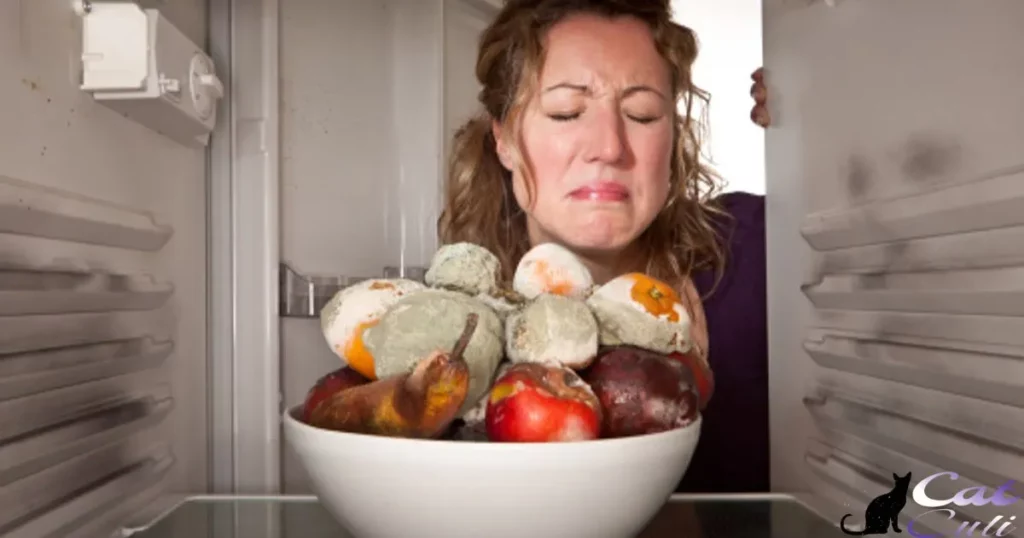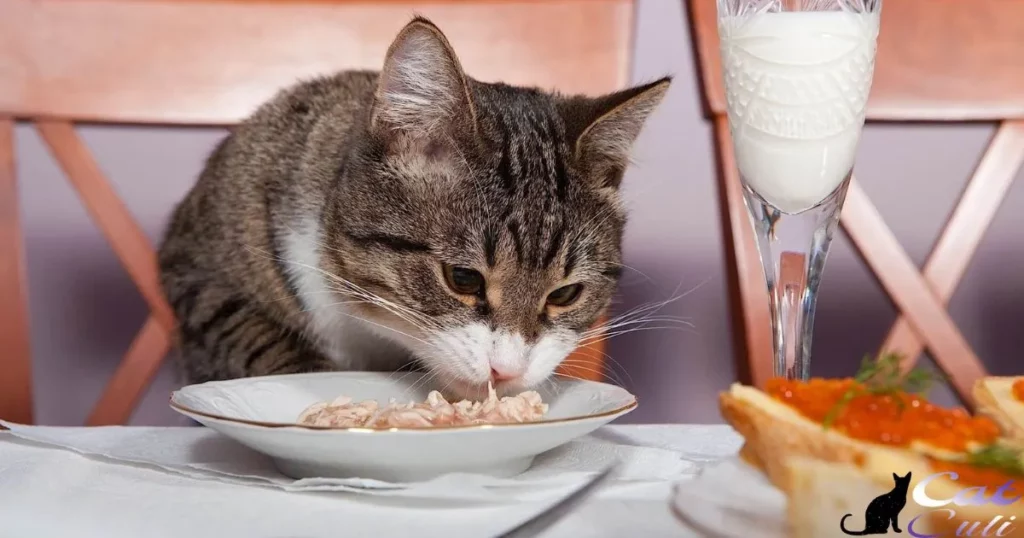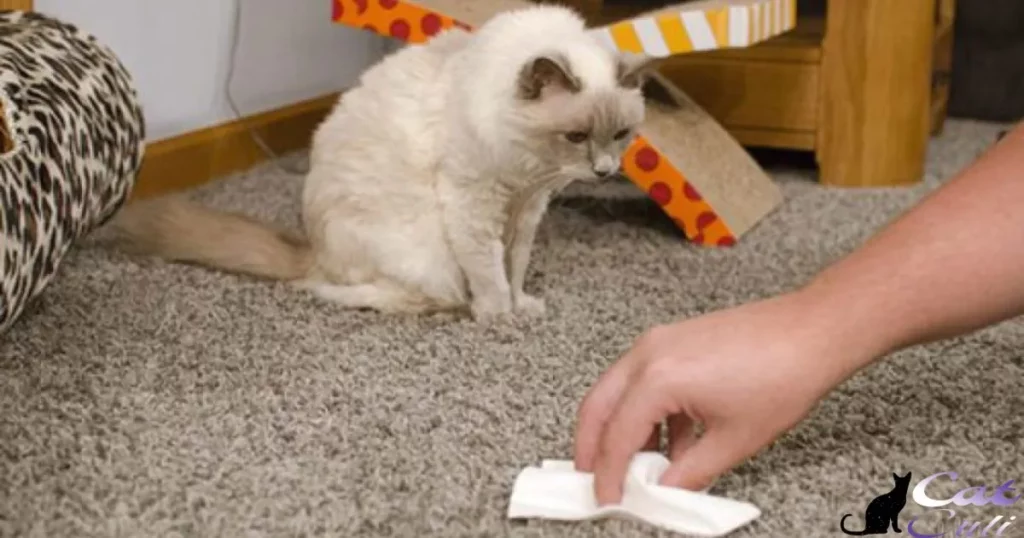Cat food smells bad due to its high protein content, often including fish or meat. The strong odour helps attract cats, who have a strong sense of smell. Ingredients like fish oils and preservatives contribute to the pungent smell that humans find unpleasant. This odour is normal and appealing to cats but might not be as pleasant to their human companions.
Have you ever wondered, Why does cat food smell so bad? The pungent aroma wafting from a freshly opened can or bag of cat food might seem unpleasant to us, but it serves a crucial purpose for our feline friends. Understanding the reasons behind this distinctive smell sheds light on the unique dietary needs and preferences of our beloved furry companions.
Stay with us to uncover why cat food emits such a strong odour. This distinct smell is a result of the ingredients used, primarily high protein content, fish oils, and preservatives. Understanding why cat food has a potent aroma helps us cater to our feline friends’ unique dietary needs and preferences.
What is Cat Food Made Of?
Cat food consists of various ingredients such as meat, poultry, fish, and grains. Manufacturers blend these components to create a balanced diet for feline companions. They often add vitamins, minerals, and other nutrients to ensure a complete and nutritious meal for cats.
Understanding what cat food is made of allows pet owners to choose the best options that meet their cats’ dietary requirements.Meat, including beef, chicken, and fish, serves as the primary component in cat food. These proteins offer essential amino acids crucial for a cat’s health.
Grains like corn or rice might be included to provide carbohydrates. Manufacturers carefully formulate these ingredients to meet specific nutritional standards, ensuring that cats receive a well-rounded diet from their food.
The Role of Protein and Fats
Proteins and fats play vital roles in cat food. Protein, sourced from meat, poultry, or fish, provides essential amino acids crucial for a cat’s growth and overall health. Fats, obtained from animal sources or plant oils, supply energy and aid in the absorption of fat-soluble vitamins.
The Process of Manufacturing Cat Food
Raw ingredients, such as meats, grains, and vitamins, are blended and cooked to create a mixture. This mixture is then formed into various shapes, such as kibble or canned food. The food is processed further, undergoing heating, drying, and sometimes adding coatings or flavourings before packaging for sale.
The Use of Additives and Preservatives
Preservatives, such as antioxidants or natural compounds, are used to prevent spoilage and extend the shelf life of cat food products. Manufacturers adhere to strict regulations to ensure the safety and effectiveness of these additives and preservatives in cat food.
How Cats Perceive the Smell of Their Food?
Cats experience their food’s smell intensely. Their keen noses detect every ingredient, especially the proteins and amino acids that make up their meals. They rely on this strong scent to determine the freshness and quality of their food.
Cats’ sensitive olfactory systems help them identify familiar scents, ensuring they’re drawn to their preferred meals every time they eat.When cats sense the aroma of their food, their brain instantly recognizes familiar odours.
This recognition triggers their appetite and excitement for the meal. Their acute sense of smell guides their eating preferences, ensuring they consume food that’s not just tasty but also meets their nutritional needs.
The Importance of Smell for Cats
Cats heavily rely on their sense of smell to navigate their world. Their olfactory abilities are incredibly sensitive, allowing them to detect various scents with precision. This heightened sense of smell serves multiple purposes for cats, including finding food, identifying familiar scents, and marking territories.
Cats’ Preference for Strong-Smelling Food
Interestingly, cats prefer strong-smelling food due to their acute sense of smell. A robust aroma in their food signals freshness and quality. The strong scent of certain ingredients, particularly proteins and amino acids, attracts cats and stimulates their appetite, ensuring they’re enticed to eat and receive the necessary nutrients for their well-being.
The Effect of Cat Food Smell on Humans

Cat food smell can impact humans in various ways. Its strong odour often triggers discomfort or displeasure, affecting the olfactory senses immediately. Some individuals might experience nausea or headaches when exposed to the potent scent for extended periods.
Despite being appealing to cats, the pungent smell of cat food can be quite off-putting for many humans, influencing their dining experiences or overall comfort in the vicinity.The intensity of the cat food smell tends to linger, making it difficult for individuals to ignore or avoid its influence.
For those with heightened sensitivity to smells, the overpowering scent of cat food might necessitate measures to mitigate its impact, such as storing the food in airtight containers or maintaining well-ventilated areas to minimize its effects on human comfort.
Why Humans Find Cat Food Smell Unpleasant
The unpleasantness of the cat food smell for humans is primarily due to the strong, pungent odour emitted by ingredients like high protein content, fish oils, and preservatives. This smell often triggers discomfort, nausea, or headaches in some individuals, impacting their olfactory senses and overall well-being.
Health Implications for Humans
While the pungent smell of cat food doesn’t pose severe health risks, sensitive individuals may find it uncomfortable. Proper storage and ventilation can alleviate discomfort. However, it’s crucial to note that Wet Food Cause Diarrhoea In Cats, necessitating attention to dietary factors for feline health.
How to Mitigate the Smell of Cat Food?
To lessen the smell of cat food, try storing it in airtight containers. These containers trap the odour and prevent it from spreading. Feeding smaller, more frequent meals can help reduce lingering smells in the feeding area. Cleaning the feeding bowls regularly with mild detergent and hot water also minimizes odour buildup.
Another way to mitigate cat food smell is by choosing cat food with fewer strong-smelling ingredients like fish or opting for dry kibble over wet food. Dry food tends to have a milder odour and can be less pungent. Adding a sprinkle of baking soda to the cat’s food or around the feeding area can help neutralize the smell without affecting the food’s taste.
Proper Storage of Cat Food
- Store cat food in airtight containers to prevent the spread of strong odours.
- Keep the food in a cool, dry place away from direct sunlight to maintain its freshness.
- Seal the bag or container tightly after each use to preserve the food’s quality and reduce odours.
Cleaning Tips for Cat Food Bowls and Containers
- Wash food bowls with hot water and mild dish detergent after each meal to prevent odour buildup.
- Consider using stainless steel or ceramic bowls, as they are easier to clean and less likely to retain odours.
- Regularly sanitize food storage containers to avoid bacterial growth and lingering smells.
Choosing Less Odorous Cat Food Options
- Opt for cat food varieties with fewer pungent ingredients like fish to minimize strong odours.
- Dry kibble tends to produce fewer smells compared to wet cat food.
- Some brands offer specially formulated cat food designed to be less odorous while still meeting your cat’s nutritional needs.
How to Choose the Least Smelly Cat Food?

Choosing the least smelly cat food involves considering a few key factors. Firstly, opt for dry food over wet as it tends to have less odour. Look for brands that use high-quality ingredients like chicken or turkey instead of fish, as fish-based foods tend to have a stronger smell.
Seek out products without artificial preservatives or additives, as these can contribute to the food’s odour.Another strategy is to check the labels for low-fat options since fat content can impact the food’s smell. Smaller, more frequent meals can help reduce the overall smell as it limits the time the food sits out.
Strong smelling cat food is fairly common in households with at least one feline
Many households with a cat experience the presence of strongly scented cat food. Cats are drawn to these odours due to their heightened sense of smell. Owners often notice the potent aroma emanating from the high-protein ingredients, such as fish or meat, commonly found in cat food.
Understanding this strong smell can help cat owners choose food that appeals to their pet’s olfactory senses.When owning a cat, it’s quite typical to encounter strongly scented cat food. These odours are attractive to cats, as their keen sense of smell allows them to appreciate the rich aroma of high-protein ingredients like fish or meat.
Owners notice this distinct smell emanating from their pet’s food, highlighting the importance of choosing cat food that caters to their pet’s olfactory preferences.
The Benefits of Smelly Cat Food
- Attracts Cats: The strong smell in cat food appeals to a cat’s heightened sense of smell, making it more enticing for them to eat.
- Nutritional Value: The potent aroma often comes from high-protein ingredients like fish or meat, indicating a richer nutritional content for feline health.
- Preference Fulfilment: Cats have specific preferences for strong-smelling food, allowing owners to cater to their pets’ tastes and ensure they eat adequately.
- Stimulation of Appetite: The pungent smell can stimulate a cat’s appetite, encouraging them to eat when they might otherwise be disinterested in food.
The Problems with Smelly Cat Food
Smelly cat food poses several issues for pet owners. Its strong odor can linger in the house, making it unpleasant for those nearby. Cats may be attracted to the scent, but it can be off-putting for humans, causing discomfort and sometimes even affecting appetite.
Moreover, the potent smell might indicate spoilage or low-quality ingredients, potentially impacting the cat’s health. Managing the odor becomes crucial not just for a pleasant environment but also for ensuring the food’s freshness and nutritional value for our feline companions.
How to Develop and Maintain Good Habits for Cat Food?
Developing and maintaining good habits for your cat’s food starts with establishing a consistent feeding schedule. Provide balanced meals at set times each day to regulate their eating habits. Introduce a variety of high-quality cat foods gradually, ensuring a mix of nutrients for their well-being.
Monitor their reactions to different foods and adjust accordingly to maintain a healthy diet.Regularly check the expiration dates of cat food to ensure freshness and avoid spoilage. Store food properly in airtight containers to preserve its quality.
Keep an eye on portion sizes to prevent overfeeding and maintain your cat’s ideal weight. By following these practices, you’ll establish and sustain healthy eating habits for your furry companion.
The Science Behind It & Tips to Manage It
| The Science Behind It | Tips to Manage It |
| Understanding pet behavior | Establish consistent routines |
| Nutritional requirements | Provide balanced, quality food |
| Importance of hydration | Ensure access to fresh water |
| Behavioral cues | Monitor for any changes |
| Digestive health | Check food expiration & storage |
| Exercise and activity | Encourage physical activity |
| Preventive healthcare | Regular vet check-ups |
| Stress and environment | Create a comfortable, safe space |
Understanding The Causes Of Cat Food Smell
The strong smell of cat food stems from its high protein content, including ingredients like fish and meat. Manufacturers use fish oils and preservatives, contributing to the potent aroma. This distinct smell attracts cats due to their keen sense of smell and specific dietary preferences.
Comprehending the reasons behind the strong scent of cat food helps pet owners select appropriate options for their feline companions. Knowing that cats are attracted to these odors can aid in understanding their nutritional needs and preferences, ensuring they receive the right diet for their health and satisfaction.
Prevention Techniques To Combat Cat Food Smell
Combatting cat food smell involves several simple prevention techniques. Store the cat food in airtight containers to contain the odour. Clean your cat’s feeding area regularly to minimize lingering smells. Consider choosing cat food with fewer pungent ingredients to lessen the overall odour in your home.
Another effective method is to opt for smaller, more frequent feedings. This reduces the time the food sits out, decreasing the chance of strong odours developing. Furthermore, proper ventilation in the feeding area helps disperse any lingering smells, keeping your home fresher for longer.
Removing Cat Food Smell From Your Home

To eliminate cat food smells at home, start by cleaning your cat’s feeding area regularly. Wipe down bowls and surrounding surfaces with a mild detergent to remove lingering odours. Ventilate your space by opening windows and using air purifiers to freshen the air.
Store leftover cat food properly in airtight containers to contain the smell. Consider using odour-neutralizing products like baking soda or vinegar to absorb and eliminate any persistent odours in your home. Regular maintenance and these simple steps can help keep your home smelling fresh despite your cat’s meals.
Maintaining A Fresh And Odour-Free Home
Keeping your home fresh and odour-free requires regular cleaning routines. Vacuum carpets and rugs, wipe surfaces, and take out the trash daily to prevent lingering smells. Ensure proper ventilation by opening windows or using air purifiers to circulate fresh air throughout your living space.
To combat specific odours, use natural remedies like baking soda to absorb smells in carpets or vinegar solutions to neutralize kitchen odours. Keeping pet areas clean and washing linens regularly also helps maintain a pleasant-smelling home environment. Consistency in cleaning habits is key to a fresh and inviting home.
Cat food smells in the house, no cat?
If your house reeks of cat food but you don’t own a cat, it could be a neighbouring cat’s food left outdoors or stray cats visiting your property. These wandering felines might leave uneaten food or spillage around, causing the smell to linger inside your house.
The smell of cat food might be due to previous tenants or neighbours who owned cats, leaving behind residual odours. In such cases, thorough cleaning and airing out your space can help eliminate the lingering scent of cat food even if you don’t have a cat of your own.
Why is wet cat food so disgusting?
Wet cat food can be off-putting due to its strong smell, primarily caused by the high protein content and added flavours like fish. Cats are attracted to these scents, but for humans, it can be quite unpleasant. The odour intensifies because wet cat food is more aromatic when compared to dry food, making it seem more disgusting to some.
The texture of wet cat food, resembling a paste or chunks in gravy, contributes to the perception of it being disgusting. Some people find the appearance and consistency unappealing, which adds to the overall perception of wet cat food as distasteful.
FAQ’s
How do I stop my cat’s food from smelling?
Store it properly—airtight containers can contain odours. Consider refrigerating or using odour-absorbing packets near the food.
Why does cat food smell weird?
High protein content and added flavours, like fish, create a strong scent to attract cats, but it can be unpleasant for humans.
Why does pet food smell bad?
The high protein, fish oils, and preservatives in pet food contribute to its strong odour, appealing to pets but not always to humans.
Conclusion
The distinct odour of cat food, often prompting the question Why does cat food smell so bad? is primarily due to its high protein content, fish oils, and added preservatives. This potent aroma serves as a magnet for cats, aligning with their strong sense of smell and taste preferences.
The balance between appealing to cats and being agreeable to human senses remains a challenge for pet food manufacturers. Embracing the peculiar scent of cat food allows us to prioritize our pets’ health and well-being, acknowledging their distinct dietary requirements.








